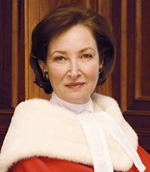A preview of the March 8 HBI event on gender and human rights

Justice Rosalie Silberman Abella
On Sunday, March 8, Canadian Supreme Court Justice Rosalie Silberman Abella will deliver the second annual Diane Markowicz Memorial Lecture on Gender and Human Rights. The program begins at 7:30 p.m. in the Usdan Student Center. For more information, read the press release or visit the Hadassah-Brandeis Institute Web site. BrandeisNOW talked with Justice Abella about her upcoming speech and her distinguished legal career.
BrandeisNOW: Your lecture will focus on gender and human rights. Why is this issue so important to you?
Justice Abella: One of the social revolutions in law in our lifetime has to do with gender. It’s been an evolutionary part of how we see ourselves in North America and I think the developments in both Canada and the United States are quite similar. The evolution has been constant: we had had the women’s suffrage movement, which introduced us to what happened in World War II with Eleanor Roosevelt’s fight even then for issues like pay equity, and then you had the development in the 1950s where everybody seemed to go back into the carapace to recover from all of the turbulence of World War II. Gender didn’t surface again as a profound social demand until the ‘60s along with the other social movements that were taking place. Part of what happened was that Brown v. Board of Education shook some of the settled notions, including the view that the way things were was the way things ought to be. So in a way we benefited from the traumatic assertion of the centrality of rights in Brown, and then took that forward into the ‘60s to examine all social arrangements. By the ‘70s, you had a decade of enormous dialogue, which transformed itself from conversation into action, where more women than ever before were determined to enter professions. When I went to law school at the end of the ‘60s, I was one of five women in a class of 150; now most law schools in Canada have over 50 percent enrollment of women. That, along with the changes to family law and the understanding of the important role that women play in the economy, is all in one lifetime. All of that has intensified in the last 25 years and it’s caused enough of a jolt to some people that along with the improvement, we’re seeing a backlash as well, with people saying there’s been too much change too quickly.
BrandeisNOW: How has your legal career allowed you to be a part of this social conversation and transformation?
Justice Abella: Just the fact that I graduated law school in 1970 when all of these issues were starting to play out gave me a front row seat and the chance to participate in many of these developments. I’ve been a judge for 32 years and on the Supreme Court of Canada for the last four, but I think that the Royal Commission Report, which dealt with barriers to employment for women, aboriginal people, people with disabilities and minorities, made one of the impacts I feel proudest of.
BrandeisNOW: You were the first Jewish woman appointed to the Supreme Court of Canada. How special was that for you?
Justice Abella: The emotion of the moment was unabashedly present in my swearing-in speech at the Supreme Court. The significance for me was that I was born in Germany in 1946 in a displaced-persons camp in Stuttgart. And to find myself on the Supreme Court of Canada as the first Jewish women from that provenance was deeply emotional to me. I can’t even begin to tell you how powerful a tribute I felt it was to my parents and their history.
BrandeisNOW: Are you looking forward to visiting Brandeis on March 8?
Justice Abella: I can’t wait. I’ve been hearing about Brandeis since my university days. Many of my friends went to Brandeis for graduate school. I was active in Hillel when I was an undergraduate and we all knew about Brandeis. Before we knew about the other Ivy League schools, we thought Brandeis was the crown. So I’m very honored to speak there.





